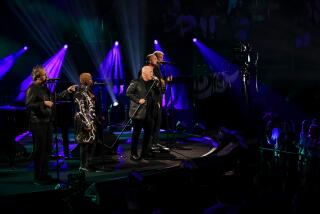The Three Tenors Salvage PBS’ Pledge Drive : Television: ‘Carreras, Domingo and Pavarotti’ even pulls in donations from non-opera lovers across the country.
- Share via
This was the year that opera saved public television.
Across the nation, public-television stations headed into their March pledge drives fearing the worst. Membership was down, donations were slow and it looked like the only stations that were going to end the drive in the black were the ones that had slashed their goals in anticipation of a slow economy.
Just one airing of “Carreras, Domingo and Pavarotti in Concert With Zubin Mehta” changed everything.
“What normally happens during a busy pledge break is that the phones start ringing and ringing,” said Tina Brock, who was taking pledges in the studio of WHYY in Philadelphia the first time the program ran. “This time, the phones were so jammed that they couldn’t ring. It was eerie. And it just went on and on.”
WHYY raised $175,000 during the 90-minute program--more than had ever been raised by a single program in the station’s history.
So they ran it again. And again.
And stations across the country began to hear rumors about a gold mine.
“In a number of markets, stations that had it scheduled for later in the month moved it up when they started hearing stories about how well it was doing,” said Jan Goldstein, spokeswoman for the Inter-regional Program Service, the nonprofit programmer that distributed “Carreras, Domingo and Pavarotti” to public-television stations.
WHYY ran the program nine times altogether, earning more than $500,000 from it.
KCET Channel 28 in Los Angeles aired it four times, pulling in more than $600,000--including a single-program record of $213,000 for the first broadcast. Station officials credit the program with single-handedly pulling them out of a looming deficit for the drive.
WNET in New York, where “Carreras, Domingo and Pavarotti” played three times in a row on a single day, earned $572,623 from the program.
“We typically get about $600 to $700 per minute during pledge,” said Jeanne Hopkins, spokeswoman for WGBH in Boston, which raised $225,000 from the program. “The average during these shows was $1,000 a minute.”
Hopkins said that the pledges during the concert’s four airings amounted to 22% of the station’s total take from its fund drive.
“Nothing has ever approached this,” said Jim Scalem, vice president for fund raising programs at the Public Broadcasting Service. Unofficial estimates put the total raised by the program, which aired on 90 public-television stations nationwide, between $4 million and $5 million, Scalem said.
“We’re guessing that it’s going to be up there among the all-time high of public television fund-raisers,” Goldstein said.
According to informal station polls, viewership went far beyond the standard audience for opera. In part because of the historical nature of the concert--leukemia-stricken Carreras had wished from his hospital bed for the three tenors to perform together--and perhaps also because the music was not limited to opera, the program attracted a fairly broad cross-section, according to station executives interviewed.
While both PBS and the Inter-regional Program Service would like to be able to repeat the success of “Carreras, Domingo and Pavarotti,” executives at both organizations said that the concert will be a tough act to follow.
PBS has two music-oriented programs in the works for August’s pledge drive, Scalem said--a tribute to folk singer Harry Chapin and a collection of songs from the Civil War. In the works for the March, 1992 drive is a concert of children’s music by Peter, Paul and Mary, to be called “Peter, Paul and Mommy.”
“We look all the time for this type of program,” Goldstein said. “But it’s a once-in-a-lifetime kind of production.”
More to Read
The biggest entertainment stories
Get our big stories about Hollywood, film, television, music, arts, culture and more right in your inbox as soon as they publish.
You may occasionally receive promotional content from the Los Angeles Times.










